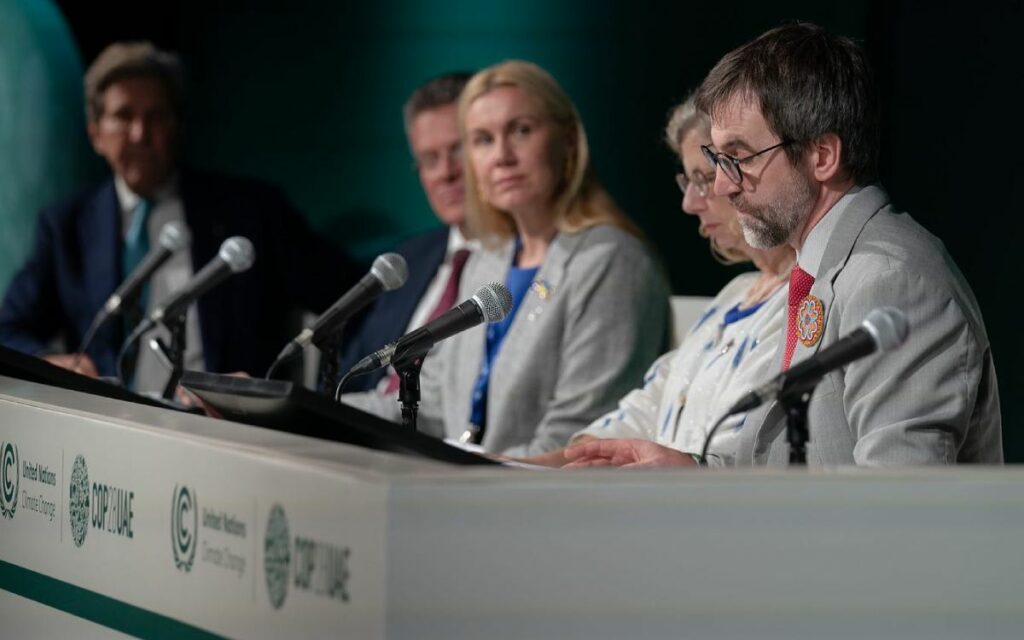
UN Climate Conference COP28 kicks off, highlighting the clash between urgent emission cutbacks and the reliance on oil and gas sectors, notably significant for Canada. Photo Credit: Facebook/ Steven Guilbeault
Last week, the biggest United Nations climate conference, Conference of Parties (COP) 28, kicked off in the United Arab Emirates. Over the next few weeks over 70,000 delegates worldwide will come together to negotiate reducing carbon emissions after a record year of fires, floods and rising temperatures.
The conference focuses on reducing carbon emissions from the oil and gas sector, a major industry not just for the host country but also for Canada. The discussion is rooted in the first-ever global stocktake, emphasizing the urgent need for action. The UN report highlights the world’s insufficient progress in meeting climate goals, stressing the necessity of cutting greenhouse gas emissions, particularly through the “phaseout of unabated fossil fuels.”
The irony of the summit is not that tens of thousands of world leaders are flying to Dubai, and producing thousands of tons of carbon emissions, for something that could have been done over Zoom, but instead by who is hosting the conference. Sultan Al Jaber, the CEO of the Abu Dhabi National Oil Company, will be chairing the discussion about how the world can reduce its reliance on oil and gas. But as they say in show business, the show must go on.
Despite not attending the summit himself, the Prime Minister has sent a long list of federal officials and ministers to the summit. The federal government is widely expected to use COP28 as an opportunity to unveil their long-delayed oil and gas sector emissions cap. Environment Minister Guilbeault anticipates advocating for the phaseout of unabated fossil fuels, signalling a commitment to cleaner transitions within the fossil fuel industry. The emissions cap, a critical component of Canada’s 2030 emissions reduction plan, is expected to face opposition from Alberta, emphasizing the ongoing challenges in reconciling federal and provincial priorities.
To add to the level of drama that could occur, the Premier of Alberta, Danielle Smith, will be in attendance and is scheduled to host a fireside chat at the federal government’s Canada pavilion. The theme of that chat is to highlight Alberta’s own carbon price scheme for industrial emitters. Given the timing of the oil and gas emission cap, Smith might have more to talk about than she thought.
Smith is no stranger to confronting Ottawa. Last week, she revealed plans to invoke the province’s controversial sovereignty act to block the federal government’s clean energy regulations. As tabled last week in the Alberta legislation, the resolution instructs governments and provincial entities such as the Alberta Electric System Operator and the Alberta Utilities Commission to ignore the federal regulations when they come into force “to the extent legally permissible.”
Adding to the list of critics in attendance is Saskatchewan’s Premier, Scott Moe. Instead of sharing a both with Smith and the federal government, Premier Moe and the province have purchased their own pavilion as the provincial energy minister claimed he didn’t trust Ottawa to “share our story.”
As COP28 unfolds, Canada and those in their delegation may find themselves at odds and may want to take separate flights home. The challenge that the federal government faces at this summit is balancing the interest and desires of world against those of the provinces and, in some cases, their re-election hopes.
The government may use COP28 to go out in a flame of glory on the international stage and burn-up upon re-entry to Canada.

Daniel Perry is a Senior Consultant with Hill & Knowlton, Canada’s leading public relations and public affairs firm. He is an experienced campaigner and has provided political advice at all levels of government. Daniel has received a number of awards during his career including being voted Ottawa’s top consultant by his peers.




















